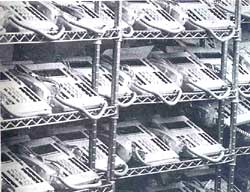Europe gives elee ronies industry a reprieve
 WHILE Europe continues its efforts ID reduce electromagnetic pollution, dw European Commission (EC) has gritated a four-year reprieve to mWons exporting electronic equipMonts. The Commission recently wowded the deadline for imposing %@&restrictions against import of shm2rouic goods that do not adhere to standards for electromag interference or pollution (EMI) md electromagnetic compatibility MINIQ fill 1996.
WHILE Europe continues its efforts ID reduce electromagnetic pollution, dw European Commission (EC) has gritated a four-year reprieve to mWons exporting electronic equipMonts. The Commission recently wowded the deadline for imposing %@&restrictions against import of shm2rouic goods that do not adhere to standards for electromag interference or pollution (EMI) md electromagnetic compatibility MINIQ fill 1996.
However, the Indian electronics industry still fears it will lose export orders for telephone receivers, broadcasting equipment and other telecommunications equipment when EC-96 standards come into force. At present, India has no mandatory standards for EMI and EMC levels, though standards have been set by some manufacturers.
Electromagnetic pollution is common in equipment, and its increase is proportional to the proliferation of electronic products. The pollution can, however, be reduced by making design changes in sub-systems and assemblies, and by providing shielding and packaging.
Official efforts to prevent EMI are being steered by the Centre for Electronics Packaging Technology and Ergonomic Design (CEPTED), created and funded jointly by the department of electronics (DoE) and the United Nations Development Programme. CEPTED has been researching the design of electronic equipment since its formation in 1989. It also trains industry personnel on EMI/EMC and ergonomic design. Products certified by it are accepted internationally. Said CEPTED joint director Ashish Sanyal, "Our training is geared to enable industry personnel to make design changes to reduce EMI and increase EMC. This is the only way we can hope to meet the EC-96 regulations."
CEPTED has worked on more than 250 products to reduce electromagnetic pollution. For instance, noise separators developed by it have removed the problem of radio broadcasts interfering with Indian Telephone Industries phones. Said ;I DoE adviser V P Kodali, "Although CEPTED has made progress in the past three years, we have decided to extend the prbject by a year as some of the critical components are yet to arrive. This will not involve any increase in project costs."
